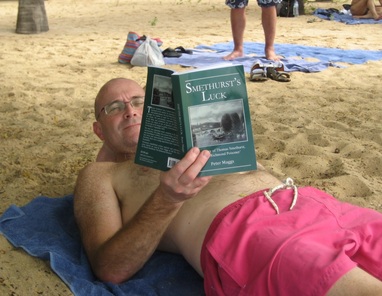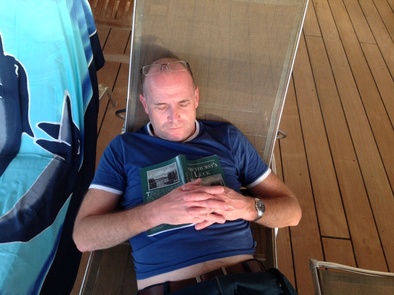|
I shall be presenting the talk on Smethurst’s Luck at Teddington Library on 25th February 2014 at 7:00 pm. The talk is open to the general public and more information may be found here:
http://www.richmond.gov.uk/events_in_libraries with a booking form here: http://www2.richmond.gov.uk/Richmondbookings/BookingStep2.aspx?id=55773 To regular followers of this blog, if indeed there be any regulars, this is your opportunity to hear the story of Thomas Smethurst from the horse’s mouth. You will also be able to purchase signed copies of the book…
0 Comments
My son bought me The Wizard of Oz (the original version) for Christmas and I watched it last week. It is staggering how good the film was for the time. The colours are vivid without being garish, the plot is clever and amusing and some of the special effects are quite brilliant, considering that it was made in 1939.
Apart from the Cowardly Lion and the Wicked Witch of the East, my favourite characters are naturally the Munchkins. But, oh dear, I can’t now listen to their main set piece, ‘Ding dong the witch is dead’ without thinking of Margaret Thatcher… I have just attended a two day course on philosophy presided over by the excellent Jane O’Grady at the ‘how to: Academy’. To say that it made my brain hurt is an understatement.
Over a period of 45 years or more I have attempted to learn something about philosophy. My interest started on making the discovery that some of Plato’s discourses are surprisingly easy to read and understand; the ones featuring Socrates can be quite amusing. But there are 2,000 years and a cosmological distance between Plato and Nietzsche, and trying to get one’s brain around the latter is hard work indeed. Still, I’m determined to give it a try, and the logical place to start must be the Greeks. Watch this space for updates. Is T S Eliot’s The Waste Land ‘ one of the most important poems of the 20th century’, or is it a quite unbelievably pretentious load of twaddle masquerading as literature? Discuss.
I was under no illusions when I started on this publishing lark. Having done all the research and much of the writing for Henry’s Trials, I was damned if I was going to let forty rejections from publishers and literary agents stop the book in its tracks. Mirli Books was the result.
Naturally, my resources are limited; I cannot afford proper marketing so I never expected substantial sales. To date, I have sold 240 copies of Henry’s Trials and 46 copies of Smethurst’s Luck. And when I did decide to venture £100 on some local magazine advertising, the response was zero. The very limited sales of both books were entirely expected, and although I would like to think that they would command some attention if only they could be adequately publicised, I am content. My level of kudos – if not income – was increased recently when I received a demand for five copies of Smethurst’s Luck for deposit in the National Library of Scotland, the Bodlian Library, Cambridge University Library, Trinity College Dublin and the National Library of Wales. Just before Christmas I made a pilgrimage to Richmond. Since the extended title of Smethurst’s Luck is ‘The Story of the Richmond Poisoner’, I concluded that it might be of some interest in that town. Sure enough I sold nearly ten copies, and there is now stock of the books at two independent retailers as well as the Local Studies Library. Sadly, not so Waterstones. They seemed to be quite interested with the local connection, but I was told that the purchasing of stock needed ‘Head-Office approval’. The manager I spoke to seemed enthusiastic about the book, but nothing ever happened. I had the same story in Chelmsford which was a shame, since when Henry’s Trials came out in 2009, having been written by a local author, the local Waterstones took several copies. Waterstones, of course, have their own problems, and controlling stock must go a very long way to keeping costs down. But I wonder if the baby is being thrown out with the bathwater. yesterday I tried to buy a copy of Whitaker’s Almanack from Waterstones. They were advertising it on line at £40, £10 off the cover price, but they ‘did not keep it in stock’ in the shop. All they had was the concise version which I did not want. So, I bought the book on Amazon for £31 delivered. I recognize that I am both poacher and game-keeper here. I do buy a lot of books and I don’t want to pay more for them than I have to. But I do like to browse, and you can’t browse on Amazon, even with their ‘look inside’ feature. Independent bookshops complain that Waterstones undercut them by discounting, so my experience with Whitaker seems to be a case of the biter bit. On the other hand, I want to sell my books for as much as possible, and all booksellers demand a substantial discount from me as a supplier. The conundrum is then, how does a high-street book-seller make a working profit, and can the market accommodate both the chains (Waterstones etc) and the Independents in the face of Amazon? Let me add that Amazon offer a superb service. I recently needed to return a book after the Post Office helpfully left it in the front garden behind the dustbin without telling me. I discovered it after it had been outside for two or three days in the rain… The operation was slick and stress free – I printed out a return label, took the book to my local Co-op, and they returned it to Amazon. The replacement arrived two days later no questions asked. However, as I have said, I cannot browse in the Amazon bookshop because there isn’t one, and Amazon has been accused of ‘poor warehouse conditions for workers’ and tax-avoidance in the UK. The latter I have commented on elsewhere in this blog. Still, Amazon is a $61B international business and is capable of looking after itself. So the question remains, how can the UK high-street – chains and independents – survive? I like browsing in bookshops and it can’t be done on line. Frequently, I buy a book purely by chance having seen it in a shop – and more often than not it is a book I had no idea that I wanted. But bookshops are businesses, and businesses must make profits. I don’t know the answer, but somewhere in there must be customer service. I find that I am always willing to pay a modest premium, say 10% or 15%, for a good service; knowledgeable, helpful and friendly staff, a ‘nice’ environment, a quick and efficient ordering service for material not in stock, and, of course, a decent browsable stock. Perhaps we should lobby for reduced business rates for bookshops. After all, books nourish the mind; surely a case can be made. I do wonder at the quality of some journalism; I have heard twice already on the Today programme this morning – and it has only been going for an hour and a half – a ‘stunning’ newspaper report: “Keep your 1986 calendars – they can be used for 2014 because they are the same…” Is this headline news? Have these people ever heard of Whitaker’s Almanack? Page 115 of my 1992 edition lists calendars for every year between 1770 and 2025. Guess what? Just 14 calendars cover the entire range… But it’s better than that because next year, 2015, is the same as 2009, so if you want to save some money…
|
AuthorWelcome to the Mirli Books blog written by Peter Maggs Archives
March 2024
Categories |


 RSS Feed
RSS Feed